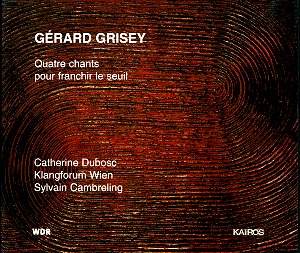Gérard Grisey was the foremost exponent of what
is generally referred to as 'French spectral music', which has also
attracted some composers from other countries as well, albeit briefly,
such as Gilles Tremblay, Magnus Lindberg and Kaija Saariaho to name
but a few. In his earlier pieces such as Périodes
(1974) and Partiels (1975) which became part of his huge
cycle Les espaces acoustiques (1974 – 1985), his music
was fairly radical in its approach to sound of which noise was also
seen as an important component. However, in his later music, some new
traits became more evident including a liking for lush harmonies and
for expression, such as in the closing piece of Les espaces acoustiques,
the brilliant Epilogue (1985) scored for large orchestra
or the very fine Le temps et l’écume, so that the
new-found expressivity of Quatre chants is no surprise
at all, but rather the logical outcome at this stage of Grisey’s musical
progress.
Quatre chants pour franchir le seuil,
completed in 1998, is Grisey’s last major work before his untimely death.
He actually did not live long enough to hear the piece’s first performance
in London in 1999. Let it be said straightaway, this is a beautiful
piece for soprano and large ensemble setting various texts, old and
new, encompassing a wide range of cultural backgrounds: old Egyptian
superscriptions, a fragment by the Greek poetess Erinna (ca. 350 BC),
a fragment from the Babylonian epos Gilgamesh and a poem by the
French writer Christian Guez Ricordi with whom Grisey had previously
collaborated. However Grisey succeeds in welding these different materials
into one musically satisfying whole by use of some recurring gestures
such as the delicately rustling sounds with which the piece opens and
which later serve as bridges between the various sections. The prelude
La mort de l’ange, on a short poem by Guez Ricordi, opens with
these softly rustling sounds. The orchestra then states a descending
motif supporting the soprano who at first sings somewhat hesitantly
before becoming more impassioned. At some points, over long-held notes,
the soprano is doubled by the trumpet to stunning effect. The first
song ends in an appeased mood. There follows Interlude I: La mort
de la civilisation on fragments of Egyptian superscriptions delivered
in a rather matter-of-fact, distant, almost clinical manner supported
by a sparse scoring. Interlude II: La mort de la voix, on lines
by Erinna, is more lyrical, with long lines in the voice part and the
orchestra as well. The Faux interlude: La mort de l’humanité,
on fragments from Gilgamesh, first depicts the deluge and then
evokes the peacefulness and beauty of the Earth after the cataclysm.
The first half of this section has more dramatic gestures but the movement
ends in utter peacefulness. So far, the music has been dark-hued, the
scoring favouring bass instruments. In the final Berceuse, the
music enters a more tranquil mood, of acceptance and of regained hope.
"It is the music of a humanity finally liberated from its nightmare
... it is a lullaby not to make one fall asleep but to awaken"
(Gérard Grisey). It is of course easy retrospectively to consider
this wonderful work as Grisey’s testament, but whatever the personal
context in which it was written, it deals with timeless, universal human
issues. As such Quatre chants pour franchir le seuil is
a deeply moving masterpiece.
I warmly recommend the present release. Catherine Dubosc
and Klangforum Wien superbly rise to the occasion and deliver a carefully
prepared, committed reading which, I hope, will earn the piece and its
composer many new friends.
Hubert Culot


